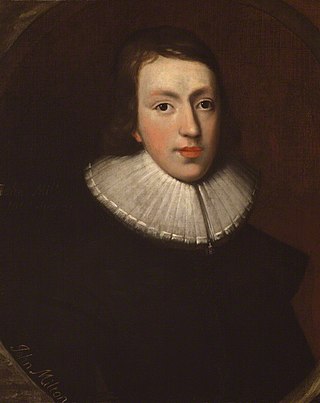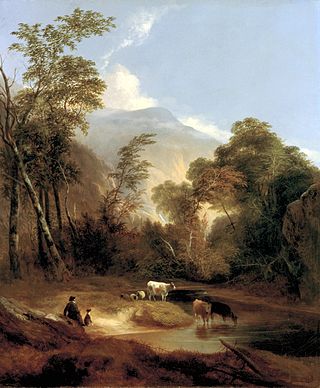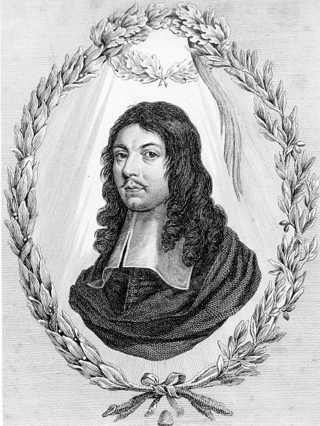
The works of the metaphysical poet and politician Andrew Marvell consists of lyric poems, Latin poems, and political and satirical pamphlets, many printed anonymously or circulated privately.

The works of the metaphysical poet and politician Andrew Marvell consists of lyric poems, Latin poems, and political and satirical pamphlets, many printed anonymously or circulated privately.
Poems of disputed authorship are marked with asterisks. Organization is based on the 1993 Everyman's Library edition. [1]

John Milton was an English poet and intellectual. His 1667 epic poem Paradise Lost, written in blank verse and including over ten chapters, was written in a time of immense religious flux and political upheaval. It addressed the fall of man, including the temptation of Adam and Eve by the fallen angel Satan and God's expulsion of them from the Garden of Eden. Paradise Lost elevated Milton's reputation as one of history's greatest poets. He also served as a civil servant for the Commonwealth of England under its Council of State and later under Oliver Cromwell.

Andrew Marvell was an English metaphysical poet, satirist and politician who sat in the House of Commons at various times between 1659 and 1678. During the Commonwealth period he was a colleague and friend of John Milton. His poems range from the love-song "To His Coy Mistress", to evocations of an aristocratic country house and garden in "Upon Appleton House" and "The Garden", the political address "An Horatian Ode upon Cromwell's Return from Ireland", and the later personal and political satires "Flecknoe" and "The Character of Holland".
William King (1663–1712) was an English poet.

Thomas Fairfax, 3rd Lord Fairfax of Cameron, also known as Sir Thomas Fairfax, was an English politician, general and Parliamentary commander-in-chief during the English Civil War. An adept and talented commander, Fairfax led Parliament to many victories, notably the crucial Battle of Naseby, becoming effectively military ruler of England, but was eventually overshadowed by his subordinate Oliver Cromwell, who was more politically adept and radical in action against Charles I. Fairfax became unhappy with Cromwell's policy and publicly refused to take part in Charles's show trial. Eventually he resigned, leaving Cromwell to control the country. Because of this, and also his honourable battlefield conduct and his active role in the Restoration of the monarchy after Cromwell's death, he was exempted from the retribution exacted on many other leaders of the revolution.
Richard Flecknoe was an English dramatist, poet and musician. He is remembered for being made the butt of satires by Andrew Marvell in 1681 and by John Dryden in Mac Flecknoe in 1682.

The pastoral genre of literature, art, or music depicts an idealised form of the shepherd's lifestyle – herding livestock around open areas of land according to the seasons and the changing availability of water and pasture. The target audience is typically an urban one. A pastoral is a work of this genre. A piece of music in the genre is usually referred to as a pastorale.

The term Metaphysical poets was coined by the critic Samuel Johnson to describe a loose group of 17th-century English poets whose work was characterised by the inventive use of conceits, and by a greater emphasis on the spoken rather than lyrical quality of their verse. These poets were not formally affiliated and few were highly regarded until 20th century attention established their importance.
"To His Coy Mistress" is a metaphysical poem written by the English author and politician Andrew Marvell (1621–1678) either during or just before the English Interregnum (1649–60). It was published posthumously in 1681.
"Upon Appleton House" is a poem written by Andrew Marvell for Thomas Fairfax, 3rd Lord Fairfax of Cameron. It was written in 1651, when Marvell was working as a tutor for Fairfax's daughter, Mary. An example of a country house poem, "Upon Appleton House" describes Fairfax's Nunappleton estate while also reflecting upon the political and religious concerns of the time.
"The Garden" is a widely anthologized poem by the seventeenth-century English poet, Andrew Marvell. The poem was first published posthumously in Miscellaneous Poems (1681). “The Garden” is one of several poems by Marvell to feature gardens, including his “Nymph Complaining for the Death her Fawn,” “The Mower Against Gardens,” and “Upon Appleton House.”

Cromwell, Protector of the Vaudois (1877) is a painting by Ford Madox Brown which depicts Oliver Cromwell in conversation with John Milton dictating a letter to Andrew Marvell protesting at the Piedmontese Easter massacre (1655), an attack on the Vaudois (Waldenses), a persecuted Protestant sect in Piedmont, northern Italy. It was Brown's second Cromwell painting, following Cromwell on his Farm (1875).
Arthur Henry King, also found as Arthur H. King, was a British poet, writer and academic.

Gondibert is an epic poem by William Davenant. In it he attempts to combine the five-act structure of English Renaissance drama with the Homeric and Virgilian epic literary tradition. Davenant also sought to incorporate modern philosophical theories about government and passion, based primarily in the work of Thomas Hobbes, to whom Davenant sent drafts of the poem for review.
Nationality words link to articles with information on the nation's poetry or literature.
Nathaniel Ingelo was an English clergyman, writer and musician, best known for the allegorical romance Bentivolio and Urania.
Nationality words link to articles with information on the nation's poetry or literature.
Nationality words link to articles with information on the nation's poetry or literature.

"The Mower's Song" is a pastoral poem by English poet Andrew Marvell, published posthumously in 1681. The work is the last of a series of four poems by Marvell known as the Mower poems. Though the mower in this poem is not named, scholars have stated that all the Mower poems are in the voice of Damon the Mower.
Roger Fenwick (1632–1658) was an English lieutenant-colonel in the New Model Army who was mortally wounded while leading his regiment at the Battle of the Dunes (1658).

An equestrian statue of Charles II trampling Cromwell stands near Newby Hall in North Yorkshire, England. It was previously sited at Gautby Hall in Lincolnshire, and was originally installed at the Stocks Market in the City of London. It is a Grade II listed building.